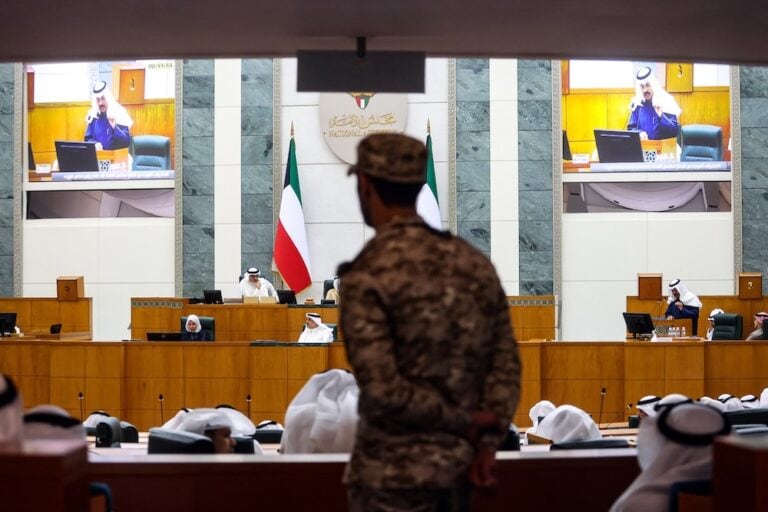Scope TV was ordered to pay approximately 1,360,000 euros to the former information minister Sheikh Faisal Al-Malek Al-Sabah, a member of the ruling family, for having broadcast a programme last October that the court deemed offensive to the royal family.
(RSF/IFEX) – 4 May 2012 – Reporters Without borders is shocked at the imposition by a Kuwaiti court of a fine of 500,000 dinars (approximately 1,360,000 euros) on the television station Scope TV for insulting a member of the royal family.
“Under the guise of protecting national unity, this exorbitant and disproportionate fine is aimed at muzzling Scope TV and all media organizations that are critical of the monarchy,” the press freedom organization said. It demanded that the penalty be rescinded.
The station was ordered to pay the sum to the former information minister Sheikh Faisal Al-Malek Al-Sabah, a member of the ruling family. The court ruled that the station’s director, Tallal Al-Said, a former member of parliament, had broadcast a programme last October that it deemed offensive to the royal family.
The verdict once again only to adds to the atmosphere of mistrust of the media.
The Kuwaiti authorities hope to further strengthen the penalties provided for in the law that regulates broadcasting. On 17 April, the information minister affirmed that he favoured the strict application of the law in order to safeguard national unity, adding that the authorities were studying the possibility of tightening the law’s penalties for news organizations that contravened it.
On 11 April, the newspaper Addustour quoted the information minister as saying any media organization that undermined national unity would be referred to the public prosecutor without favouritism.
On 22 April, the government submitted a national unity bill to parliament, which includes a provision for a prison sentence of between three and seven years and a minimum fine of 3,000 dinars (nearly 8,200 euros) for anyone who failed to observe certain sections of the law. These specify that national unity is flouted where media organizations denigrate minorities, incite hatred based on religious beliefs or fail to respect the privacy of individuals.
On 18 March, about 50 members of the majority Al-Awazem tribe invaded the premises of Scope TV in Kuwait City, destroying part of the building’s façade and vandalizing some of its offices.
They were protesting over remarks they considered insulting during a programme presented by Fayez Baty, in which a Shi’ite member of parliament Hussein Al-Qalaf was reported to have criticized the Al-Awazem leader, Falah Bin Jamae.
As a result of the interview, the Kuwaiti government decided to bring a prosecution against the TV station, accusing it of engendering sectarianism and damaging national unity.
The following day, the station’s management took the station off air in protest over the attack. According to the newspaper Al-Watan on 23 March, Fayez Baty resigned after apologizing and expressing his regret.
On 29 April, three members of the Al-Awazem tribe charged with taking part in the attack on the station’s offices were released by the public prosecutor after paying fines of 1,000 dinars (about 2,700 euros).
Previously, during the campaign for the parliamentary elections in February, Scope TV was prosecuted for broadcasting comments by the candidate in the third electoral district, Mohammed Al-Juwaihel, a liberal strongly opposed to trial influence in politics. He was reported to have strongly criticized the tribes involved. In the wake of his comments, supporters of tribal leaders set fire to the candidate’s premises.
On 31 January, tribal supporters stormed the offices of the station Al-Watan when a televised debate was to have taken place between two candidates, Islamist-backed Faysal Al-Muslim and Nabil Al-Fadl, a pro-government candidate opposed to the Motairi tribe.
Reporters Without Borders has learned that access to the website of the independent online newspaper Watan has been blocked since 12 March. Based in the United States, Watan is available in Arabic and English. Its website cannot be accessed inside Kuwait and anyone trying to do so is greeted with the message: “The website was blocked by the Ministry of Communication in accordance with article VII of the Ministerial Resolution No. 103 of 2000, Paragraph one on the regulations and bases of the Internet service provided by Internet companies in the state of Kuwait.”
The site administrators were not informed of the move and have been given no reason for it. On 29 March, Bassam Mahdawi, managing editor of Al-Watan, confirmed to Reporters without Borders that the site could still not be accessed from Kuwait. Saudi Arabia and Syria have also censored the online newspaper.


